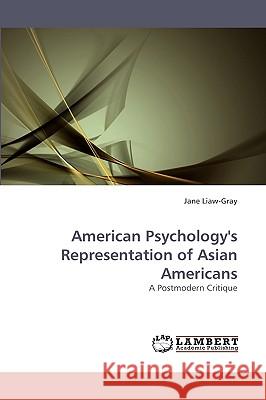American Psychology's Representation of Asian Americans » książka
American Psychology's Representation of Asian Americans
ISBN-13: 9783838357294 / Angielski / Miękka / 2010 / 76 str.
The way American modern psychology approaches research on Asian Americans raises problematic issues regarding national race relations and oppression. Race is typically treated as a nominal, present-versus-absent category, such as on a census checklist or demographics questionnaire, and the complexity of racial experience is all but ignored. This book uses postmodern methodology to highlight the ambiguity of race, specifically Asian American race. In accordance with the scholarship of Michael Omi, Howard Winant, Dana Takagi, and Laura Uba, the author exposes how race operates simultaneously as a sociobiological reality and as an illusion, argues that individuals can be racialized or deracialized depending on their context and location vis-a-vis others in society, explores how racism operates via the construction of a group specific racial "other," and analyzes the strong link between the racial "other" and American ideology. The author further comments on how these findings have practical applicability within clinical practice. This book should be especially useful to professionals in psychology or other social science fields."
The way American modern psychology approaches research on Asian Americans raises problematic issues regarding national race relations and oppression. Race is typically treated as a nominal, present-versus-absent category, such as on a census checklist or demographics questionnaire, and the complexity of racial experience is all but ignored. This book uses postmodern methodology to highlight the ambiguity of race, specifically Asian American race. In accordance with the scholarship of Michael Omi, Howard Winant, Dana Takagi, and Laura Uba, the author exposes how race operates simultaneously as a sociobiological reality and as an illusion, argues that individuals can be racialized or deracialized depending on their context and location vis-à-vis others in society, explores how racism operates via the construction of a group specific racial "other," and analyzes the strong link between the racial "other" and American ideology. The author further comments on how these findings have practical applicability within clinical practice. This book should be especially useful to professionals in psychology or other social science fields.











